Reflections on Mission
- Apply
- Visit
- Give
- Admissions
- Academics
- Campus Life
- Alumni
- Athletics
- About
- Information
- At a Glance
- Accolades
- Directory
- Historical Facts
- Jesuit Mission
- Accreditation
- Accessibility
- Student Consumer Information
- Sustainability
- Administration
- President's Office
- Mission and Ministry
- Center for Arts & Letters
- Diversity
- Community Outreach
- Campus Security
- Office of Compliance & Risk Management
- Finance Office
- Human Resources
- University Marketing & Communications
- News
- Recent Headlines
- Rockhurst Magazine
Douglas N. Dunham, Ph.D., Vice President for Academic Affairs
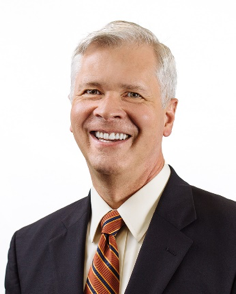
On Rockhurst’s bell tower, you will find the following inscription:
“You are called by the Society of Jesus to be men and women who reflect upon the reality of the world around you with all its ambiguities, opportunities, and challenges, to discern what is really happening in your life and in the lives of others, to find God there and to discover where God is calling you, to employ criteria for significant choices that reflect Godly values rather than narrow, exclusive self-interest, to make decisions in the light of what is truly for the greater glory of God and the service of those in need, and then to act accordingly.” Peter-Hans Kolvenbach, S.J., 29th Superior General of the Society of Jesus, 1997
I can easily get overwhelmed thinking about my role, as the chief academic officer, in this “calling.” But then I am reminded of that basic Jesuit principle about which Father Curran consistently reminds us: We are companions on a journey, called to unite in our efforts to make God’s good world, better.
I find this liberating for a couple of reasons. First, there is a freedom that comes with recognizing that, as companions, each of us – not one of us – is responsible for striving to achieve our mission. As the Gestaltists used to say, “The whole is different than the sum of its parts.”
Second, regarding one another as companions changes the conversation: It naturally focuses attention on strengths, rather than weaknesses. When looking for a travel companion, don’t you look for someone who complements you? For instance, some of us might be good at generating ideas, but we need those who are good at planning and executing these ideas. Some of us are more extraverted and enjoy social interaction, but we also need those who prefer critical support roles.
Companionship is key to our journey.
Myles P. Gartland, Ph.D., Professor of Analytics and Management
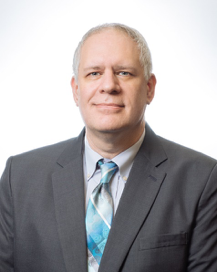
Along my seventeen years at the University I feel as if our mission has become a part of me. While there is no single part of our mission and core values that I treasure more than any other, the one that has influenced me the most personally and professionally is reflection and discernment.
While I personally practice it every day, I feel I live our mission by helping our students reflect and discern on their own lives. For most of my years at the University I have worked with our graduate students. These individuals have come back to school in search of something. Many times, that thing it is not clear to them. Or many times that thing may seem to be clear at the time, but life takes them in many directions during their education.
So, my favorite part of being an educator and administrator is my role as a mentor. Students routinely occupy my office looking for a new career, new meaning in their lives, or just who they want to be in the future. My passion is to teach them to reflect on and discern how to answer that question for themselves. Most of my mentor conversations are merely asking them many of the questions as one might in the spiritual exercises. I want them to look for more than a job but rather find a passion in their work. I can always see it in their faces when their reflection uncovers something they did not even realize about themselves.
It is a great pleasure to give just a small assistance in order to help our students find that new direction and who God meant them to be.
Dale Harak, Ph.D., Associate Professor of Chemistry
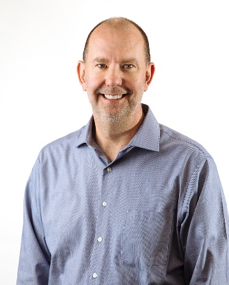
Several years ago, during the time that I was an undergraduate at a liberal arts institution in north central Oklahoma, I was introduced to the concept of intelligent design in a philosophy class through some of the writings of Thomas Aquinas. As a budding scientist, I struggled with Aquinas’ thoughts. Although his argument was certainly appealing—explaining, for example, why the complexity of the natural world must have been designed by intelligent, omnipotent being—I questioned, “wouldn’t Aquinas have needed experimental data to lend validity to his statements?” I was nearing the end of my undergraduate study in chemistry, and knew very well the importance of experimentation, the documentation of laboratory work, and reproducibility to further our knowledge in science using collectively what is referred to as the scientific method.
Shortly after graduate school, and upon accepting my current position, I began the process of learning about the specific liberal arts tradition at Rockhurst. Being no stranger to the liberal arts tradition, I found it easy to extol to students the virtues of a liberal arts education and to model attitudes and behaviors associated with a broad, well-rounded education. As part of this process, though, I was reminded of the intelligent design issue. Wasn’t my work as a scientist contributing to the experimental evidence for an intelligent designer?
During my career, I’ve had many successes and failures in my scientific efforts; but the experimental data, which I’ve struggled to collect, analyze, and interpret, do add to the body of knowledge that helps us further understand the complexities of the natural world. For me, the complexities and intricacies of the natural world are intelligently designed by God, and the understanding of just one small piece of the universe—based on our experimental work—is a gift from God. Scientific discoveries occur when, after we have collected data and interpreted it, God shares a small part of his divine insight with us. And so, by closely examining and discovering even the smallest things, we are finding God.
Mary Haskins, Ph.D., Professor of Biology
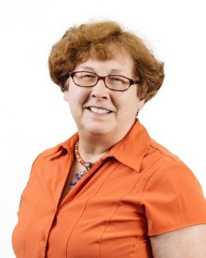
In our fast-paced world, we juggle a great number of responsibilities. The effects of our harried lifestyles are sometimes captured in the Kenyan proverb, “Two waterfalls do not hear one another”. Like the water pouring over a fall, rather than hearing and contemplating diverse viewpoints, many of us rush to meet our own objectives, sometimes with little regard for those around us.
Martin Luther King, Jr. once stated, “The function of education is to teach one to think intensively and…critically. Intelligence plus character…is the goal of true education.” Thinking critically requires an investment of time and a culture of inclusivity that ensures issues have been thoroughly examined from a variety of perspectives. It requires time to recognize the complexity of an issue, time to develop good questions, time to hear the viewpoints of others, time to develop an ethical framework and time to cultivate the moral fortitude through which to analyze and develop appropriate responses to multifaceted issues.
I recently hiked Colorado’s Manitou Incline which averages a 41% grade and gains 2000 feet of elevation in a mere 0.88 miles. Throughout my struggle to the summit, strangers, who were also struggling with the hike, used their precious oxygen for words of encouragement. Although I could have finished the Incline without their support, I found myself heartened with each verbal exchange.The experience and the words of encouragement from strangers reminded me that I need to be actively present, and that just a few words of support can inspire someone who might be struggling. By taking the time to both motivate and challenge my students with authentic and complex issues, my hope is they will learn to value inclusivity, become more attentive and reflective, and ultimately become truly educated men and women for others.
Ms. Susan Janet, Assistant to Vice President for Student Development and Athletics

The mission – a big concept that is supposed to permeate everything we do at Rockhurst. Because it is so big and important, we might be intimidated. We might think that such a big idea can only be served by the biggest things we do in our job. Mission means those things that are specifically labeled, MISSION: HANDLE WITH CARE. Furthering the mission, in that case, can only be accomplished through the obvious pursuits that scream mission.
I do like to engage in activities that “scream” mission. I enjoy participating in service trips, and the relationships I have forged on those trips loom large in my mind when I think of mission. I enjoy community liturgies and prayer services. As a cradle Catholic and product of Catholic education, those activities seem natural to me. I am proud to be part of an institution that prizes them.
My job, however, does not revolve around those “big” mission events. My day-to-day job requires a routine of doing the ordinary, seeing to office operations, helping students deal with routine student life issues. Where is the mission in those daily tasks?
Of course, the mission should be everywhere in those tasks. If I cannot serve the mission by completing the work that comprises the bulk of my position, doesn’t that effectively reduce the mission to something confined and compartmentalized?
I must keep in mind that the mission lives in the ordinary things we do at Rockhurst. Like the Scripture reading when Elijah recognizes the voice of God in a tiny whisper, and not the tremendous wind, or powerful earthquake, or terrible fire. The mission starts when I do my job well, and do it mindful of how it should be done – carefully and intentionally, in service to others, and finding God in all things.
I do what I can in the small things that make up my job, and in the occasional big things that provide special inspiration to me. Whether I am doing the ordinary or joining an inspiring group of students over spring break in Jamaica, I need to remember that I am living the mission.
Shatonda Jones, Ph.D., Assistant Professor of Communication Sciences and Disorders
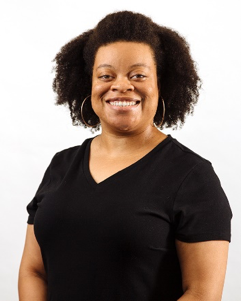
Rockhurst’s mission and core values closely align with my own mission. My personal mission has always been to serve and stand in unity with individuals and groups seeking more for their lives, wanting to improve their condition, and desiring to make a positive lasting mark on the world. I am fortunate that my day-to-day work allows me to use my talent and skills to be in service to others.
I am a speech language pathologist (SLP), a researcher, an advocate, and a faculty member in the Department of Communication Sciences and Disorders. All of my roles center on one very important theme: helping people communicate. A person’s ability to communicate can be limited because of health related issues or because of marginalization in society. In my work as an SLP, I provide therapy services to individuals who have had their communication affected by neurological conditions like stroke and traumatic brain injury. I volunteer services with people who do not have the financial resources to pay for therapy and with individuals who may not qualify for services because of other constraints.
As a faculty member, I work to provide the best possible education to students who want to become SLPs. My goal for each of my students is that they are able to provide the best possible evidence-based care to their clients and families. I do this by engaging with students both inside and outside the classroom through research, service learning, and other educational opportunities. As a researcher and an advocate, I seek to help individuals and families find the voice they need to advocate for themselves. It is in each of these roles that I live the mission.
John Kerrigan, Ph.D., Associate Professor of English
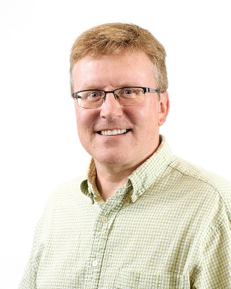
When I am at my best in my work at Rockhurst, Ignatian values such as reflection and discernment inform my approach. I try to make visible for my students times when Ignatian concepts come to bear on the practices we’re engaged in in class, to help them “see” how the mission can work on us. As I teach English, I try to create classroom environments that are open and hospitable. In Composition classes, cura personalis is a lived value as I start to learn about my students’ experiences as writers, in one-on-one meetings early in the semester. My intent is to foster a relationship with them that will bring about an environment of trust and support as we work together. Working within such an environment helps students become more self-aware as writers, seeing where and how they can work, themselves, to improve.
More and more, technological evolutions in modern culture, for all their benefits, sometimes draw us into cultures of like-mindedness: more reinforcing than helping us to struggle against the tendency to stop learning and growing, to just know what we know. One of the many things I derive from the Ignatian tradition’s educational emphases comes from its openness, its ability to help us engage in genuine, caring discourse with other people, no matter how we might disagree. There is a great value in stepping back to recognize the humanity of that person whom we might regard as “other”. In other words, the Ignatian concept of “finding God in all things,” means to me proceeding with a hopeful spirit, being predisposed to try to look for the good in others. Literature classes provide an especially fertile ground for such encounters. In my experience, students learn the most when they are challenged by ways of thinking they may not have anticipated or fully thought through before.
Ms. Kris Pace, Controller

“For I know the Plans I have for you,” declares the Lord, “plans to prosper you and not harm you, plans to give you a hope and a future.” Jeremiah 29:11
Every other Friday morning during the school year, the University Planning and Budgeting Committee begins their meeting with this prayer. Then as a collective group, we strive to make strategic decisions that will best benefit the University and guide the University towards a prosperous, hopeful future, where students will be afforded a transformative college experience and staff & faculty will be valued for their contributions.
As a member of the Finance Office, my job is to ensure that the financial aspects of those decisions and the overall financial activities of the University as a whole are accounted for and reported properly. While I do not have frequent interaction with students on a daily basis, I am living the mission of Rockhurst by ensuring that the financial resources of the University can support the mission of educating our students, who have entrusted their lives and financial resources to us, to develop them into leaders who will “set the world on fire.”
Ms. Gina Speese, Associate Director of Annual Giving & Data Analytics
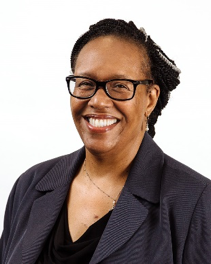
I believe God meant for me to be at Rockhurst. My dear father reminded me recently that when I was in the fourth grade, I declared to my parents that “I am going to Rockhurst!” At the tender age of eight or nine, I’m sure I had no idea what that really meant. In high school, Rockhurst was the only college I applied to because I knew it was where I was going. It never crossed my mind to have a plan B.
Jesuit discernment was part of my spirit before I knew what Jesuit really meant. Thankfully, I was accepted and had a wonderful college experience on these wonderful grounds. All these years later, I am back on this sacred ground and love living our mission in the work that I do as a fundraiser for RU. I live the mission every day with our amazing students, faculty and staff. Our students shine as passionate communicators and caregivers of our world. Each one of us is a light, a beacon and an ambassador for Rockhurst. Education has always been important to my family and to me. Living the mission means that I help make this educational experience accessible to as many as possible. I’m thankful that this is where God meant for me to be.
Bill Stancil, Ph.D., Professor of Theology & Religious Studies
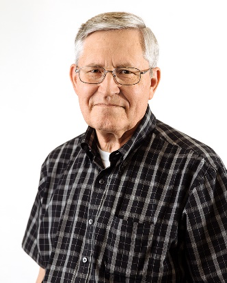
In 1939, the editors of the magazine Christian Century asked several prominent theologians to write articles entitled “How My Mind Has Changed.” The assumption was that the great cultural and political events of the 1930s (the Great Depression, the war in Europe) affected the way these theologians thought about God, humanity, and the world around them.
Imagine what the response would be if politicians were asked to write such an article today. No politician would write an article titled “How My Mind Has Changed.” In the political arena, to change one’s mind is to be labeled a flip flopper, an opportunist. If one were truly to embrace this viewpoint, life-long learning would be unnecessary. Maturity would mean never changing one’s mind.
However, we know that change is not only inevitable but necessary. At mid-life, the Patriarch Abraham found himself in a spiritual impasse. He lived in a polytheistic world but had heard the voice of the one God, telling him to leave his home and family and journey to a new land. He obeyed that voice, but his journey to the new land was not a straight line, geographically or spiritually. God had promised him descendants and a country, but no timetable. He pressed on, embracing the unknown.
One of my obligations to my students is to acknowledge my own limitations and gaps in knowledge and wisdom. If we are truly companions together, faculty and students alike, we must mutually be on this journey as explorers and not settlers. To do anything less is to shrink back. John Henry Cardinal Newman said it best: “To live is to change, and to be perfect is to have changed often.”
Risa Stein, Ph.D., Professor of Psychology
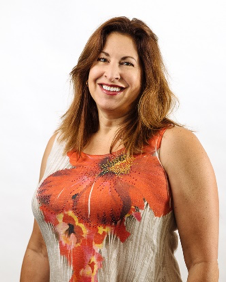
For me, the Jesuit Mission is a Life Mission. I am not Catholic, but I take the values to heart. I believe college should set the stage for tremendous personal growth. A young person’s curiosity, openness to new experiences, and appreciation of the value of learning for learning’s sake, ought to be fortified across these years. This is even more important considering that, unlike the work place of just 30 years ago, today’s students will enter an economy characterized by global communication, agile movement, cooperation, and innovation. They will be well served by recognizing and learning to value their unique perspectives and constellation of skills.
For this to occur, they must be challenged to think in a nurturing environment. Unfortunately, many US schools still operate under and Industrial Revolution model valuing absolutes and conformity that run contrary to Jesuit values. Most students have been conditioned to view self-expression in a classroom as fraught with risk and associated with vulnerability and potential failure. They have so much to offer, yet they are often hesitant to do so.
For this reason, I strive to exercise a pedagogy steeped in conceptual understanding and problem-focused exploration. I empower my students to think for themselves in broad and divergent ways about social problems meaningful to them. Self-discovery and improving self-knowledge throughout the learning process is paramount as everything we create comes from inside of us. I, too, derive great joy from being surrounded by others who continually contribute to my personal growth. Overall, my guiding philosophy rests upon Cura Personalis. I feel strongly that when the whole person is nurtured and appreciated, the other values are naturally realized.
Brendan Sweetman, Ph.D., Professor of Philosophy
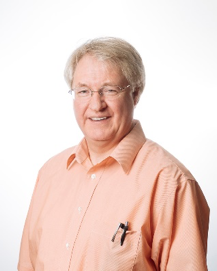
My approach to the mission of Rockhurst is through my discipline and my understanding of the goals of my work as teacher, philosopher and scholar. One of the ideals of the Jesuit mission is a commitment to the intrinsic value of the intellectual life and to the disinterested pursuit of truth, reflected especially in the College's core curriculum. This ideal is founded on our commitment to the view that human beings seek and can find the truth with regard to the challenging questions of life. One of my aims is to stimulate and cultivate intellectual thinking about central questions in a systematic, rigorous and historically informed way. This is why we attempt to cultivate in each student the ability to competently identify and assess different worldviews, to understand the foundation of particular points of view, and to be able to gauge the assumptions, implications, and logical structure of arguments of all kinds, including those that would shape society and culture.
A central theme of our mission is that human beings are made in the image and likeness of God, and so we take seriously religious responses to foundational questions. Indeed, philosophy has a unique ability to defend the dignity of the human person. In my own work, I have defended the rationality of religious belief, and have argued for the compatibility of faith and reason, and for the integration of religion and science. I also encourage my students to focus on two things when pursuing the incredible opportunity of a Rockhurst education that their parents have worked hard to make available for them: the skills required for the career they have in mind, but also a strong foundation in the liberal arts. Education is not just about acquiring skills or learning facts, but is (primarily) about ideas. Ideas shape society, and if you do not learn to handle them, they will handle you! This is why a well-rounded education is truly transformative.
Julia Vargas, Ph.D., Director for the Center of Service Learning
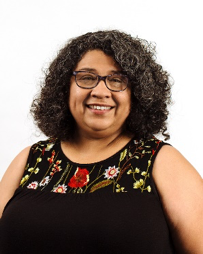
As the director of the Center for Service Learning, I find it easy for me to connect my work to the university’s mission. Through service-learning courses, community service activities, and civic engagement programs, I try to provide opportunities for students, faculty, and staff to put the mission into action by connecting to the community through service. However, the nature of service in the Jesuit tradition goes beyond the idea of volunteerism.
Service in the Jesuit tradition includes time for reflection and a commitment to justice. These qualities connected with me from the beginning. As I sat waiting to start a long day of interviews, I noticed a calligraphy display:
You are called by the Society of Jesus to be men and women who reflect upon the reality of the world around you with all of its ambiguities, opportunities, and challenges to discern what is really happening in your life and in the lives of others to find God there and to discover where God is call you to employ criteria for significant choices that reflect Godly values rather than narrow exclusive, self interest to make decisions in the light of what is truly for the greater glory of God and the service of those in need and then to act accordingly.
– Rev. Peter-Hans Kolvenbach, S.J., Superior General of the Society of Jesus, 1997
I read this over and over; each time a different part jumped out to me as a personal call to action. I was the young person who never had a career aspiration but wanted to make a difference. I worked in the nonprofit sector to improve the lives of those we served. I came to Rockhurst to continue to make a difference by connecting faculty, students, and staff to community groups and supporting their work through service. Together we are making God’s good world better.







